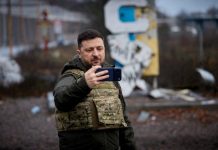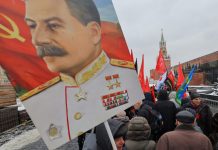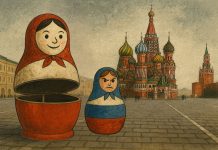
Russian propaganda influences not only Russia’s neighbours but also the European Union, writes Grigory Mesezhnikov, the director of the Slovakia-based Institute for Public Affairs, specially for charter97.org.
One of the directions of foreign expansion of the current Russian regime – apart from the ongoing military aggression against Ukraine and systematic pressure on the countries of the former Soviet Union with the aim to prevent a rapprochement with Europe – has become a media war against the West.
Main task of ‘propaganda troops’
Although in the context of the Ukraine conflict the main task of the initiators of the aforementioned war is promotion of the Russian version of events in the West, their main goal, of course, is beyond the scope of the Russian-Ukrainian conflict. It lies in the weakening and gradual corruption of the Western world, paralyzing of western integration structures (EU and NATO), creating the conditions for the conversion of pro-Russian forces in the European countries in an important factor of their socio-political development. Western countries that have become the object of hostile information activities, have to respond to the situation, and this reaction can be considered late and not yet very effective.
One and a half years of the Russian-Ukrainian conflict and the information war against the West provided an opportunity to observe the actions of the Russian ‘media propaganda’ troops and their European allies, as they say, at close range. From that close distance it can be seen that the specificity of the Russian information war against the West (as well, however, as the Russian military undertaking in Crimea and Donbass) is that it is carried out not by the rules but, in fact, consists entirely of prohibited methods, which creates a big problem for the West.
The Western world needs to fend off the corrupting Russian propaganda and, to preserve at least the balance of power, pass to the offensive. Instead, it is subject to doubt about what methods should be used to repel the propaganda waves from the East.
The West does not want to and cannot lose the face of the free world, based on the search for truth. “The truth, the whole truth and nothing but the truth” is the basic principle used by the Western world in its opposition to Russia’s information aggression. Its implementation, however, requires a system that is not so easy to build.
Slovakia – a weak link?
Slovakia is today a part of the Western world. Situated on the border of the EU/NATO with the countries of the Eastern Partnership, it is at the forefront of the ongoing information war. Apparently, Moscow considers Slovakia as a weak – from the point of view of the West – link in Central Europe. This perception can be confirmed by the intensity of the efforts made to sway public opinion in Slovakia, and, most importantly, the local political elite in favor of Moscow’s actions in Crimea and Dobass, the number of public events held in Bratislava by the overt and covert supporters of the current Russian leadership, by the volume of materials with pro-Russian content placed into the information space of Slovakia and appearing on websites emerging like mushrooms after the rain, the websites of the Slovak language (based on the calculations of the teacher and civic activist Juraj Smatana systematically monitoring the Slovak cyberspace, the number of such sites is currently over forty).
It was Slovakia this year that became the place where demonstrations against the establishment of NATO military bases and the presence of NATO armed forces were held for a few months (no one, however, has seen any NATO bases in Slovakia, apart from Slovak Army bases, in this country, and there have been no plans to build them). In early 2015, a group of pro-Russian activists, united around a conspiracy magazine with anti-Semitic tinge, announced the collection of signatures for a petition demanding a referendum on the withdrawal of the Slovak Republic from NATO. It is in Slovakia that supporters of the Russian leaders held an enthusiastic meeting of notorious ‘Night Wolves’. However, very soon it became clear that these were not real ‘wolves’, but their ‘replacements’ from the Baltic states, Latvian citizens with EU passports, and that among the participants of the meeting were likely to prevail Russian-speaking persons with undetermined citizenship. Still, the information on the warm reception of the Russian motorists and ‘fighters against fascism in Ukraine and in Europe’ went on the air of the Russian federal television channels and channel Russia Today.
It is in the Slovak capital that the self-proclaimed ‘Donetsk People’s Republic’, established its ‘honorable consulate’ headed by the little-known businessman, who was also the Chairman of one of the two Slovak-Chinese Chambers of Commerce operating in the country.
How much did the Russian choice of “Slovak weak link” pay off? Were the expectations that Slovakia would occupy a special position in the Russian-Ukrainian conflict, and the local pro-Russian leaders would play a determinant role in the information standoff with the West confirmed?
Historical preconditions for ‘Slavic solidarity’
In Slovakia, there are indeed certain historical and ideological conditions for activation of the supporters of the current Russian leadership in the wake of the Kremlin-inspired ‘Slavic solidarity’ used as a cover of the current aggression against Ukraine. You may, for example, recall that the Slovak national figure Ludovit Stur, a fighter for the emancipation of the Slovak nation, considered the founder of modern Slovak language (he lived in the XIX century), and who is still included in the pantheon of national heroes, at the end of his life called upon Slovaks to cling to the mighty Russian roots, to embrace Russian and Orthodox Christianity, join as a nation the autocratic Russia, and in fact dissolve in the ‘Russian world’.
The idea of pan-Slavic solidarity is still popular in some circles (actually it has a certain similarity with russophile sentiments – Ukraine, for example, automatically drops out of such solidarity). Left-wing circles in Slovakia, especially the Communist Party, at the time saw Russia (Soviet Union) as an ideal social order. At the end of the Second World War, that Slovakia, being a formally independent state, fought on the side of Nazi Germany, the Slovak Communist leader Gustav Husak offered Stalin to include this country into the USSR as a seventeen republic, and only the persistent opposition of the then Czechoslovak President Eduard Benes did not allow for that idea – which certainly did not seem quite so crazy at the time – to become implemented. At the end of the 1960s the same Husak helped the Kremlin leadership to deal with the legacy of the ‘Prague Spring’ after the armed invasion of the Soviet Union and the Warsaw Pact countries into Czechoslovakia.
Unambiguous position of Slovakia
Slovakia’s official position on the issue of the Russian-Ukrainian conflict is unambiguous – Slovakia rejected the annexation of Crimea and condemned the separatist rebellion in Donbas. It supported the sanctions, introduced by the European Union in response to Russia’s aggression and has strictly followed them. Thanks to the reverse pumping of gas to Ukraine through Slovakia, Kyiv was able to successfully withstand the pressure of Moscow and managed to have Gazprom reduce its tariffs. Slovak President Andrej Kiska is among the European politicians who have a solid position on the Russian participation in the war against Ukraine and the need for an appropriate response in Europe (condemnation, economic and political pressure on the aggressor, keeping sanctions), as well as strengthening of defense cooperation among NATO members. Foreign Ministry of Slovakia is one of the most active advocates of comprehensive support of reforms assumed by the independent Ukraine. And while Slovak Prime Minister Robert Fico has long been known for his personal sympathies to the Russian president and has often spoken about the harm of the sanctions, saying that they allegedly did not bring the expected results and have hindered the settlement of the conflict, he initiated no practical steps towards the lifting of the sanctions in Brussels, knowing how important the EU membership is for Slovakia, especially the participation in the common European market.
Demonstrations against NATO, the main organizer and speaker at which was the former dissident, former chairman of the Christian Democratic Movement and former Prime Minister of Slovakia Jan Charnogursky, gradually disappeared (number of participants – the Communists, nationalists, left-wing and right-wing radicals, supporters of the “New Russia “- counted on the strength of hundreds). On the petition for referendum on secession of Slovakia from NATO six months after its initiation, no one remembers, she just collapsed.
Actions of pro-Western community
Obviously, Russia and its local allies, despite all the efforts so far, has not yet succeeded to strike Slovakia from the single European column. This, however, did not happen by itself, but became the result of the general (although mostly not coordinated and spontaneous) actions of pro-Western, pro-democracy social forces – the center-right opposition parties, activists of non-governmental organizations, members of civil initiatives, representatives of the community of intellectuals and experts who decided to put barrier to the penetration of Kremlin influence – both political and ideological.
A series of open letters and appeals, with which, starting from the middle of 2014, well-known figures of civil society, culture, science and art turned to the population and the political elite in Slovakia (eight of these appeals were published, some of them in cooperation with the Czech colleagues) could serve as an example. Their authors not only strongly condemned the Russian aggression against Ukraine, supported the EU in imposition of sanctions and the policy of reforms and European integration of the Ukrainian state, but also strongly opposed flirtation of the local political elite (especially Prime Minister Robert Fico) with the Kremlin, they were against the introduction of Russian propaganda stereotypes in the public space of the country. These appeals were widely discussed in the Slovak society and became an important element of the ongoing debate in the country on the main reference points of foreign policy and about their value foundations.
Pro-Russian radicals unite
There has formed in Slovakia an opposite camp – the camp of open supporters of the current Russian government. Its composition is traditional and is comparable to the composition of the groups in the countries of Western Europe. It includes orthodox communists Stalinists, eurosceptics, radical nationalists, right-wing extremists, and anti-Westerners of all colors.
Recently, in the wake of anti-immigrant sentiment in Slovakia, ardent nationalists and right-wing radicals, most of whom declare themselves the supporters of Vladimir Putin became active in Slovakia. At a recent demonstration of radical nationalists and neo-Nazis against immigration in Bratislava, some of its participants openly admitted their personal sympathies wearing the T-shirts with portraits of Vladimir Putin, or the arms of Russia. After the demonstration, representatives of several right-wing extremist organizations said that they intend to create a single ‘national-patriotic’ party that would run in the next parliamentary elections (March 2016). It is already clear what the foreign policy reference points of the party will be, if it is created. Apparently, the Slovak democrats will soon have a lot of work to do.
By Grigory Mesezhnikov, for charter97.org




